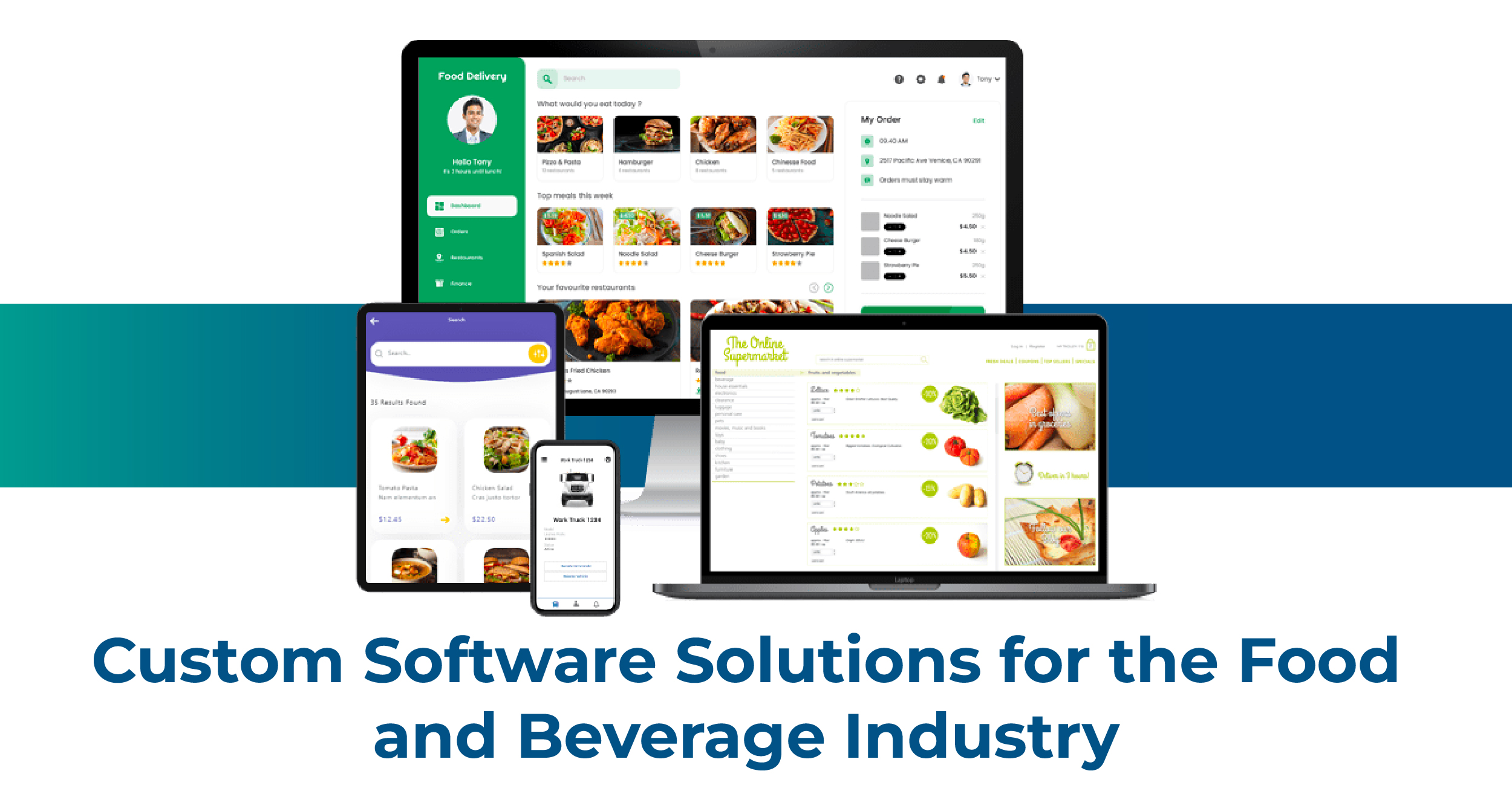Blog
Custom Software Solutions for the Food and Beverage Industry
October 7, 2022
Posted by: DevDigital
Like any industry, companies in the food and beverage industry – from a single restaurant to a large food producer and distributor – have specialized needs. At the same time, they have familiar business challenges related to managing corporate resources, maintaining relationships with customers, attracting new customers, and so on. Many custom software products exist to serve this industry, but that software does not solve every need. The situation is the same as in other settings where industries have specialized needs that require custom software or specialized mobile apps. Other businesses that need complex integrations or customized software for internal use, are development jobs that usually require specialized skills and training.
Software in Food and Beverage Businesses
Software companies offer specialized enterprise resource planning (ERP), compliance, and other types of software for food and beverage (F&B) companies. If you make candy and want a better way to manage your entire production process from finding potential suppliers to putting boxes of candy in trucks, there is likely a product for that. If your company has two restaurants and three food trucks, there may be a different product that suits your enterprise resource planning needs. Regardless of the company’s business needs, there is off-the-shelf software that can meet most marketing, HR, and other needs.
However, many of these software packages have their limitations. This is inevitable given how diverse the industry is; software vendors cannot realistically anticipate and address everything. Software to connect enterprise-level software, custom web-based software, and mobile apps all can fill different specialized needs across restaurant, packaging, wholesale, and other F&B businesses.
Streamlining Operations with APIs
A business might need to make various programs work together, typically by sharing information. No one has the time to manually go and update databases and code. Most businesses have better uses for their staff and their payroll anyway. The solution is to automate behind-the-scenes functions using Application Programming Interface (API) coding. Some of the APIs are free and open source but others are not. Either way, connecting two or more pieces of software can be a complex technical undertaking. A company with three food trucks and two restaurants will need to outsource the work. A candy maker with 100 people on the payroll will have to do this as well.
Most medium and large businesses develop internal business processes that are automated using cloud-based software, web apps, and mobile apps. Most of the marketing, enterprise resource planning, and training tools a company needs can be integrated in different ways. Sometimes an existing, free API makes the needed connection easily enough.
Some integrations of this nature take technical expertise plus experience with cloud-based enterprise software. Consider a restaurant chain that needs to connect. Getting a payment processing gateway to interface with a human resources information system might be easy. Or it might be complicated by different rules that the systems use. What if your company allows staff to take on distinct roles at various locations, at different pay rates? The human resources management information system (HRMIS), the payment processor, and the timekeeping software may not make this easy.
One option is to create some manual workarounds, like downloading reports or creating dummy employee records so everyone has three or four accounts with their roles and pay rates. This would be a temporary fix but it’s not going to work for long; Additionally, you shouldn’t have to create this type of unnecessary work. You can avoid unnecessary work and the potential for mistakes by creating custom connectors between human resources, timekeeping, and payment processor software.
Custom Software for Leveraging Big Data
We live in the age of Big Data, which is vast and rapidly changing information on customer behavior and buying trends and presents opportunities for the prepared marketing team. Big data applications offer far more than superior insight into current and potential customers; You can also use masses of rapidly changing data for:
- Waste reduction
- Supply change management
- Quality control
- Predictive analytics
The larger the enterprise, the more likely the investment in advanced data collection and analytics will pay off. But it seems like any food and beverage company bigger than a mom-and-pop operation could benefit from setting up data collection and analytics.
Connecting with Customers Using Mobile Apps
That restaurant and food truck owner may want a mobile app to connect with customers. The actual business reason does not matter because the development challenges are pretty much the same. You need an app that looks good, is stable, and runs well on both iOS and Android devices. The app needs to be more than an online ad or “Contact Us” page. You want dynamic content like promotions, news, events, exclusive deals for repeat customers, or a customer loyalty program.
Your Food and Beverage Industry Software Solution
Your Food and Beverage Industry Software SolutionLike any industry segment, the food and beverage industry has some standard business needs in the areas of marketing, branding, data analysis, and accounting. A variety of software exists to meet those needs, but that software cannot do everything. Many companies end up using custom software and API integrations to connect their software or custom-made mobile apps. DevDigital has helped a wide range of businesses integrate their cloud-based software, create custom software, and launch apps. If you have a software development project in mind, we invite you to contact us and set up a brief conversation.
